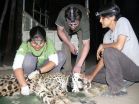Study finds that rejecting unsuitable suitors is easier said than done
2014-11-21
(Press-News.org) You're at a slumber party with your friends. One friend asks "if a guy at school asked you out, but you weren't really attracted to him, would you go?" You laugh and shake your head no: "Why would I, if he's not my type?"
Or imagine you're at school, sitting in the cafeteria. A guy who you think is attractive but who has some unsuitable personality traits comes up and asks you out. You say yes, even though what you really meant to say was no. "Why did I do that?" you wonder.
According to new research from the University of Toronto and Yale University, rejecting unsuitable romantic partners is easy in hypothetical situations, but not so when considering a face-to-face proposition.
"When actually faced with a potential date, we don't like to reject a person and make them feel bad, which is not necessarily something that people anticipate when they imagine making these choices," says the study's lead researcher, psychology PhD candidate Samantha Joel. "The fact that we underestimate how concerned we'll feel about hurting the other person's feelings may help to explain why people's dating decisions often don't match up with their stated dating preferences."
The study came in two parts. In the first, participants completed their own dating profile. Then they were given three profiles which supposedly belonged to other participants. Participants were split into real and hypothetical situations. Those in the real situation were told that the potential dates were in the lab next door and could meet them. Those in the hypothetical situation were told that the potential dates were unavailable, but to imagine the possibility of meeting them.
Participants selected their favourite profile of the three. They were then given additional information about the potential date - including a photo of an unattractive person, and a completed questionnaire that suggested the potential date wanted to meet them. The participants completed the same questionnaire: those in the real situation were told that it would be presented to the potential date and those in the hypothetical situation were to imagine the potential date receiving it.
The researchers found that those in the real situation were more likely to accept the date from the unattractive suitor. When asked, the participants said they were concerned about hurting the potential dates' feelings.
In the second part of the study, the researchers surveyed participants' willingness to accept dates with individuals whose qualities or attributes were undesirable because of habits or traits, rather than physical unattractiveness. These deal-breaking attributes included, for example, opposite political or religious views. Instead of being presented with photos, participants received a questionnaire that suggested that their chosen dates were incompatible with them, based on prior reports they gave. They then filled out the same questionnaire and were told it would be presented to the potential date. Again, those in the hypothetical situation were more likely to reject the dates than those considering a face-to-face proposition.
"I think it's incredible that people care so much about not hurting the feelings of potential dates who they haven't even met if they think they'll actually meet them," says Joel. "Next, I'd like to explore how much this concern might come into play when people make later, perhaps more serious relationship decisions."
The study "People overestimate their willingness to reject potential romantic partners by overlooking their concern for other people" was recently published in Psychological Science.
INFORMATION:
ELSE PRESS RELEASES FROM THIS DATE:
2014-11-21
As an actress, producer, director and theatre arts lecturer at The University of Texas at Arlington, Julienne Greer knows the techniques that help draw people's deepest emotions to the surface. Now, she's building on her experience and research to help scientists and robotics engineers better understand the human experience so that they can build more responsive robots.
Greer, who holds a master's degree in media arts and a doctorate in humanities, recently authored the paper, "Building emotional authenticity between humans and robots." In it, she referenced a robot named ...
2014-11-21
OAKLAND, Calif., Nov. 21, 2014 -- Digoxin, a drug commonly used to treat heart conditions, was associated with a 71 percent higher risk of death and a 63 percent higher risk of hospitalization among adults with diagnosed atrial fibrillation and no evidence of heart failure, according to a Kaiser Permanente study that appears in the current online issue of Circulation: Arrhythmia and Electrophysiology.
Digoxin is a drug derived from digitalis, which has been used for more than a century for heart-rate control in patients with atrial fibrillation, and it remains commonly ...
2014-11-21
Patients who receive more cells get significant benefits. That's a key lesson emerging from a clinical trial that was reported this week at the American Heart Association meeting in Chicago.
In this study, doctors treated heart attack patients with their own bone marrow cells, selected for their healing potential and then reinjected into the heart, in an effort to improve the heart's recovery.
In the PreSERVE-AMI phase II trial, physicians from 60 sites treated 161 patients, making the study one of the largest to assess cell therapy for heart attacks in the United States. ...
2014-11-21
Scientists have identified four new genes associated with the severe food allergy eosinophilic esophagitis (EoE). Because the genes appear to have roles in other allergic diseases and in inflammation, the findings may point toward potential new treatments for EoE.
"This research adds to the evidence that genetic factors play key roles in EoE, and broadens our knowledge of biological networks that may offer attractive targets for therapy," said study leader Hakon Hakonarson, M.D., Ph.D., director of the Center for Applied Genomics at The Children's Hospital of Philadelphia ...
2014-11-21
Study says leopards stay surprisingly close to homes
Leopard home range around humans can be comparable to world's best protected areas
Article available from PLOS ONE
NEW YORK (November 21, 2014) - In the first-ever GPS-based study of leopards in India, led by WCS and partners has delved into the secret lives of these big cats, and recorded their strategies to thrive in human-dominated areas.
The study concludes that leopards in human areas are not always 'stray' or 'conflict' animals but residents, potentially requiring policy makers to rethink India's leopard-management ...
2014-11-21
November 21, 2014 -- A study conducted by researchers at Columbia University's Mailman School of Public Health shows that obesity costs the U.S. $8.65 billion per year as a result of absenteeism in the workplace --more than 9% of all absenteeism costs. The consequences of obesity among the working population go beyond healthcare and create a financial challenge not only for the nation but for individual states as well. Findings are published online in the Journal of Occupational and Environmental Medicine.
The study is the first to provide state-level estimates of obesity-attributable ...
2014-11-21
Lugano/Geneva, Switzerland, 21 November 2014 - New evidence that immune checkpoint inhibitors may work in glioblastoma and brain metastases was presented today by Dr Anna Sophie Berghoff at the ESMO Symposium on Immuno-Oncology 2014 in Geneva, Switzerland.
The novel research shows that brain metastases have dense concentrations of tumour infiltrating lymphocytes, providing an immunoactive environment. Moreover, both primary and secondary brain cancers often exhibit high expression of the immunosuppressive factor programmed cell death ligand 1 (PDL1), which can be inhibited ...
2014-11-21
One of the most mysterious forms of life may turn out to be a rich and untapped source of antibacterial drugs.
The mysterious life form is Archaea, a family of single-celled organisms that thrive in environments like boiling hydrothermal pools and smoking deep sea vents which are too extreme for most other species to survive.
"It is the first discovery of a functional antibacterial gene in Archaea," said Seth Bordenstein, the associate professor of biological sciences at Vanderbilt University who directed the study, "You can't overstate the significance of the antibiotic ...
2014-11-21
Prison policies vary on treating transgendered inmates, which could put inmates and institutions at risk. Gina Gibbs, a University of Cincinnati criminal justice doctoral student, will present a synopsis of the legal issues posed by such inmates at the annual meeting of the American Society of Criminology. The national conference runs from Nov. 19-22 in San Francisco.
At the center of the debate are Eighth Amendment protections against cruel and unusual punishment, widely varying policies on the treatment of transgendered populations and, Gibbs says, court crackdowns ...
2014-11-21
CHAMPAIGN, Ill. -- Retired baseball stars Barry Bonds, Mark McGwire and Rafael Palmeiro each had Hall of Fame-worthy numbers, each hitting more than 500 home runs.
All three also were tarred by allegations of steroid use.
Their stories, however, received very different treatment over 12 years of national television news coverage, says University of Illinois professor Brian Quick, lead author on a paper about that coverage and its effects, published online Nov. 20 by the journal Communication Research.
"We found that Bonds received more than twice as many negative stories ...
LAST 30 PRESS RELEASES:
[Press-News.org] Study finds that rejecting unsuitable suitors is easier said than done





